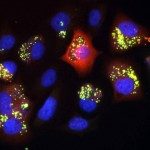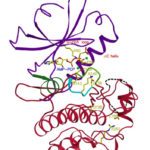Lien vers Pubmed [PMID] – 12950916
Mol. Microbiol. 2003 Sep;49(6):1493-508
Bacterial genomics revealed the widespread presence of eukaryotic-like protein kinases and phosphatases in prokaryotes, but little is known on their biochemical properties, regulation mechanisms and physiological roles. Here we focus on the catalytic domains of two trans-membrane enzymes, the Ser/Thr protein kinase PknB and the protein phosphatase PstP from Mycobacterium tuberculosis. PstP was found to specifically dephosphorylate model phospho-Ser/Thr substrates in a Mn2+-dependent manner. Autophosphorylated PknB was shown to be a substrate for Pstp and its kinase activity was affected by PstP-mediated dephosphorylation. Two threonine residues in the PknB activation loop, found to be mostly disordered in the crystal structure of this kinase, namely Thr171 and Thr173, were identified as the target for PknB autophosphorylation and PstP dephosphorylation. Replacement of these threonine residues by alanine significantly decreased the kinase activity, confirming their direct regulatory role. These results indicate that, as for eukaryotic homologues, phosphorylation of the activation loop provides a regulation mechanism of mycobacterial kinases and strongly suggest that PknB and PstP could work as a functional pair in vivo to control mycobacterial cell growth.

